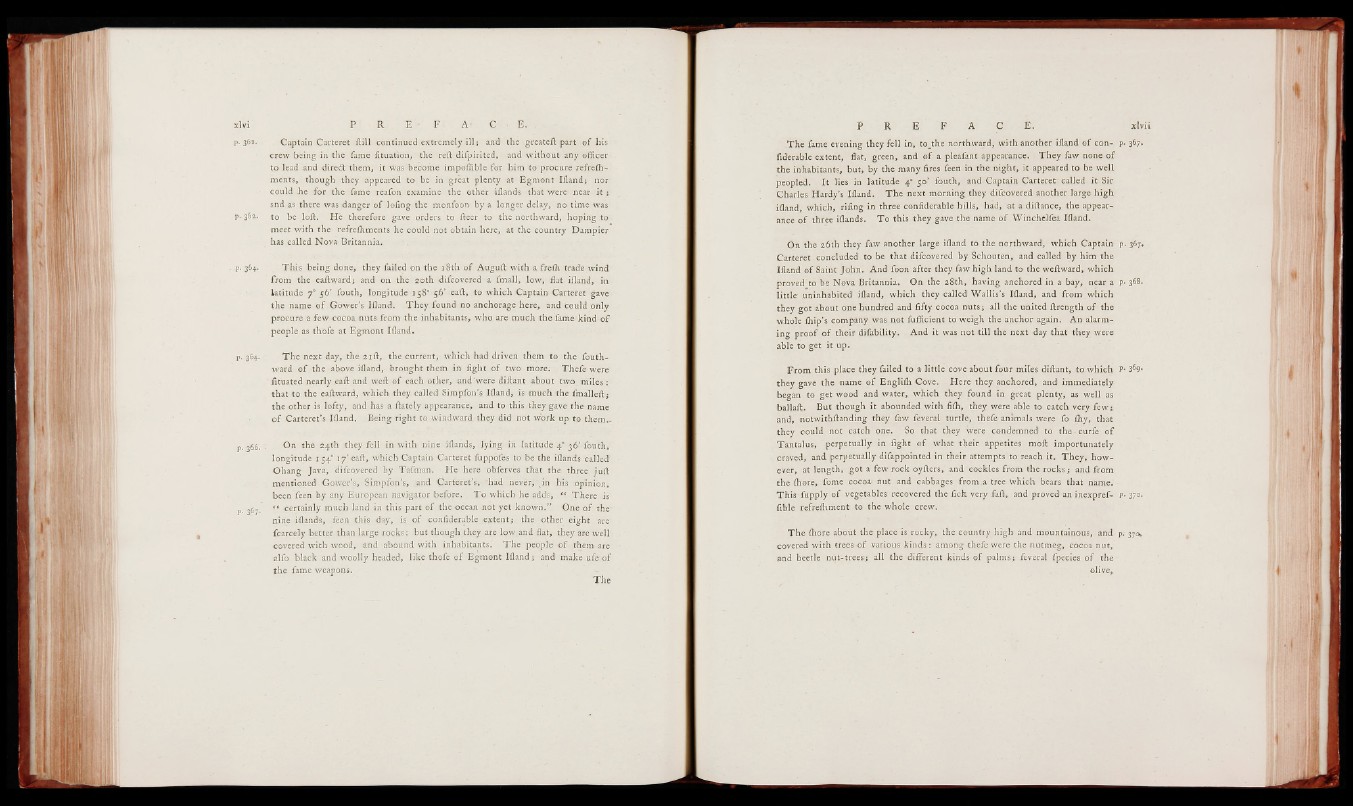
Captain Carteret itili continued extremely ill; and the greateft part of his
crew being in the fame fituation, the reft difpirited, and without any officer
to lead and diredt them, it was become impoftible for him to procure refreih-
ments, though they appeared to be in great plenty at Egmont Ifland; nor
could .he for the fame reafon examine the other iflands that were near it ;
snd as there was danger of lofing the monfoon by a longer delay, no time was
to be loft. He therefore gave orders to fteer to thé northward, hoping .to
meet with the refrefhments he could not obtain here, at the country Dampier
has called Nova Britannia.
This being done, they failed on the 18 th of Auguft with a freih trade wind
from the eaftward; and on the 20th difcovered a fmall, low, flat ifland, in
latitude y° 56’ fouth, longitude 158° 56’ eaft, to which Captain Carteret gave
the name of Gower’s Ifland. They found no anchorage here, and could only
procure a few cocoa, nuts from the inhabitants, who are much the fame kind of
people as thofe at Egmont Ifland.
The next day, thé 21 ft, the current, which had driven them to the fouth-
ward of the above ifland, brought them in fight of two more. Thefe were
fituated nearly eaft and weft of each other, and'were diftant about two miles :
that to the eaftward, which they called Simpfon’s Ifland, is much the fmalleft;
the other is lofty, and has a ftately appearance, and to this they gave the name
o f Carteret’s Ifland. Being right to windward they did not work up tp them.-
On the 24th they fell in with nine iflands, lying in latitude 40 3 6 ’ fouth,
longitude 1540 17’ eaft, which Captain Carteret fuppol'es to be the iflands called
Ohang Java, difcoyered by Tafman. He here obferves that the three juft
mentioned Gower’s* Simpfon’s, and Carteret’s, 'had never, in his opinion,
been feen by any European navigator before. To which he adds, “ There is
“ certainly much land in this part of the ocean not yet known.” One of the~
nine iflands, feen this day, is of confiderable extent; the other eight are
fcarcely better than large rocks: but though they are low.and flat, they are well
covered with wood, and abound with inhabitants., The people of them are
alfo black and woolly headed, like thofe of Egmont Ifland; and make ufc of
the fame weapons.
.The fame evening they fell in, to_the northward, with another ifland of con- p. 367.
fiderable extent, flat, green, and of a pleafant appearance. They faw none of
the inhabitants, but, by the many fires feen in the night, it appeared to be well
peopled. It lies in latitude 40 50’ fouth, and Captain Carteret-called it Sir
Charles Hardy’s Ifland. The next morning they difcovered another large high
ifland, which, rifing in three confiderable hills, had, at a diftance, the appearance
of three iflands. To this they gave the name of Winchelfea Ifland.
On the 26th they faw another large ifland to the northward, which Captain p. 367.
Carteret concluded to be that difcovered by Schouten, and called by him the
Ifland of Saint John. And foon after they faw high land to the weftward, which
proved to be Nova Britannia. On the 28th, having anchored in a bay, near a p- 368.
little uninhabited ifland, which they called Wallis’s Ifland, and from which
they got'about one hundred and fifty cocoa nuts; all the united ftrength of the
whole fhip’s company was not fufficient to weigh the anchor again. An alarming
proof of their difability. And it was not till the next day that they were
able to get it up.
From this place they failed to a little cove about four miles diftant, to which P- 3^9*
they gave the name of Engliih Cove. Here they anchored, and immediately
began to get wood and water, which they found in great plenty,, as well as
ballaft. But though it abounded with fifh, they were able to catch very few;
and, notwithftanding they faw feveral turtle, thefe animals were fo ihy, that
they could not catch one. So that they were condemned to the-curfe of
Tantalus, perpetually in fight of what their appetites moft importunately
craved, and perpetually difappointed in their attempts to reach it. They, however,
at length, got a few rock oyfters, and cockles from the rocks; and from
the ihore, fome cocoa nut and cabbages from .a tree which bears that name. -
This fupply of vegetables recovered the fick very faft, and proved an inexpref- p> 370.
fible refreihment to the whole crew.
The ihore about the place is rocky, the country high and mountainous, and p.- 3 7 a ,
covered with trees of various kinds: among thefe were the nutmeg, cocoa nut,
and beetle nut-trees; all the different kinds of palms; feveral fpecies of the
olive,